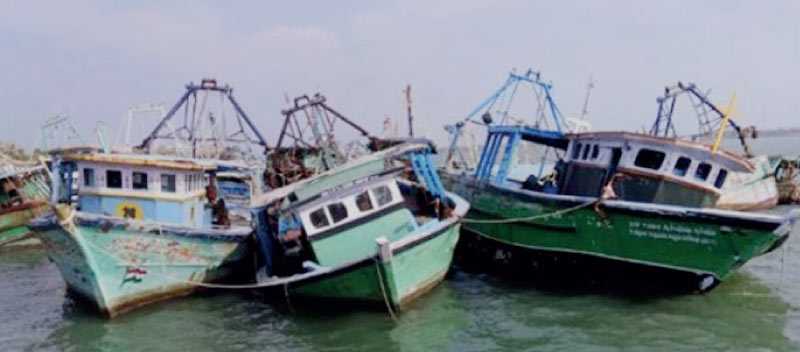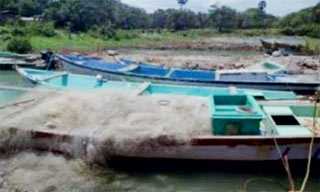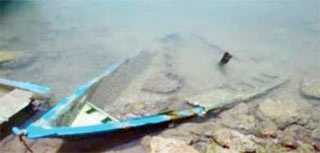Friday Feb 20, 2026
Friday Feb 20, 2026
Friday, 20 November 2020 01:16 - - {{hitsCtrl.values.hits}}

Tethered boats
By N. Lohathayalan
 |
| Mosquito breeding grounds |
 |
| Unsalvageable boat
|
There is a big question as to whether some people tried to find some basis for escalating the problem between India and Sri Lanka over the boats abandoned by Indian fisherman in Sri Lanka by joining it to the problems faced by the northern fishermen. It has now become problematic to the extent that both Governments are worried.
While Indian fishermen enter Sri Lankan waters and effectively take over Sri Lankan territory, it affects our internal fisherfolk because the fishing stock available to them is also depleted. During the past years, a few hundred Indian fishing vessels entering Sri Lankan waters and interdicted by our Navy have remained in limbo. Indians demanded their return while Sri Lankan fishermen, mainly Tamil, are opposed to it.
A Sri Lankan Minister, with his own legal problems in India over his participation in gun battles in the streets of Chennai, has weighed in with Tamil fishermen and is opposed to going soft on the boat issue. He has gained some following among fisherfolk on account. India too may be soft on him, given his ability to foment trouble for it with Indian fishermen.
This is a major problem between the two countries and no solution has been in sight for many decades – till now, and this settlement of sorts is being disturbed.
In this festering state of affairs, Sri Lanka’s Attorney General issued a recommendation in the year 2019 that boats interdicted from 2015 to 2018 be released. On this basis the courts decided to release the boats. Accordingly, Indian officials in charge of their territorial waters and the boat owners visited Sri Lanka, and returned with those boats in seaworthy or reparable condition, effectively abandoning the remaining boats. They took back with them 27 boats from Jaffna and 10 from Mannar. The rest were presumably worthless, or minimally not in a condition to be taken back.
Those abandoned boats were tethered to the shore in places like Kiranji and Karaitivu near naval bases. On account of rainwater accumulating in the boats, they soon had become mosquito breeding sites. The area was also an eyesore. So a decision was made on 27 August 2020 by the Working Committee to Stop Illegal Activities at Sea under the Ministry of Fisheries to request Court to remove the abandoned vessels. This was by the Jaffna Assistant Director of the Department of Fisheries citing the Attorney General’s recommendation. A key figure in this is believed to be Sri Lanka’s Minister with the fisheries portfolio, Douglas Devananda.
Based on these requests to the courts from the Ministry of Fisheries and the Attorney General’s Recommendation, and the Advisory Note from the Director at the Ministry of Foreign Affairs, the Kayts Court on 5 October issued order under case B/216/17 permitting the auctioning of 94 of these boats.
In like manner, the Mannar Court gave permission on 4 November to auction or destroy (unlike the Jaffna order which did not cover destruction) 27 other boats. A solution, it seemed, had been found.
However, when these Court rulings came to be published in Colombo-based media and through Indian news outlets, the problem erupted anew. As news that 121 Indian boats were to be auctioned or destroyed made its way through Tamil Nadu, several organisations representing fishermen began to protest. No mention is made that the best of the boats had already been returned.
It is a little puzzling that many fisher-organisation representatives who came to Sri Lanka in 2019, inspected the boats, and returned with the salvageable ones, are also members of organisations now protesting the destruction or auctioning of boats.
At the same time, when the judgement and motion from the Fisheries Department were examined, it became clear from the wording of the judgement and the attachments to the Ministry’s motion that the Indian High Commission had expressed its lack of objections to the auctioning of the boats in a letter to Sri Lanka’s Foreign Ministry. This knowledge seems to be of explosive consequences in Tamil Nadu. From that it was recognised that the Indian High Commission had well-understood the situation when writing to the Foreign Ministry.
What will happen when the Court’s ruling is implemented? Or will there be a request to make it less explosive?